7.1: Dialogue
- Page ID
- 142313
Dialogue
Situation. A la Cité des Sciences et de l'Industrie. C'est la dernière semaine des cours. Une classe visite l'exposition, "L'Homme réparé." A la sortie, entouré de ses étudiants, le prof les interroge.
| LE PROF | Qu'est-ce qui vous a impressionné le plus? | |
| ARMAND | Pour moi, c'est le paradoxe que les guerres et les catastrophes sont à l'origine de développements scientifiques et techniques importants. | |
| CAMILLE | Oui, on nous explique, par exemple, comment il faut traiter les brûlures0, les intoxications0 et les fractures0. | 0 burns/poisonings (including food poisonings)/fractures |
| BERTRAND | C'est vâchement impressionnant de voir toutes les techniques que les médecins utilisent pour "réparer" les hommes. Vous avez vu les prothèses électroniques? | |
| VIOLAINE | Pas mal. Avec l'électronique et les ordinateurs0 on a trouvé des computers systèmes de compensation pour les personnes infirmes0, les personnes sourdes0 ou aveugles0. Certaines de ces solutions sont géniales. | 0 computers/ill, in poor health/deaf/blind |
| LE PROF | Alors vous avez appris quelque chose? | |
| LES ÉTUDIANTS | Oui, beaucoup. | |
| LE PROF | Bon! Et maintenant, allons à la Geode1 nous allons voir deux films. Nos réservations sont pour quatorze heures. | |
| LES ÉTUDIANTS | Oh, chouette0. | 0 great |
1 geodesic dome at the Villetie science center on the outskirts of Paris
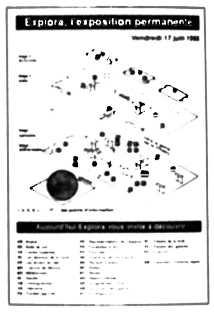
Exercice I
Recall (or invent) an outing by your high school science class to a museum of science and industry and recreate (in French) your response to the question, "Qu'est-ce qui vous a impressionné le plus?" Many scientific terms are cognates so you probably can talk about something fairly esoteric and find the vocabulary you need in a good dictionary. Again, it would be useful to use Le Petit Larousse. Write just one or two sentences.
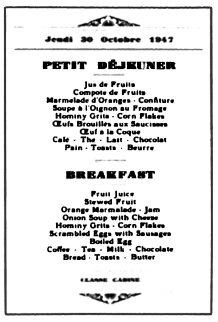
Questions et Réponses
A. Are you hungry? Do you have a headache?
- —Avez-vous faim?
- —Non, je n'ai pas faim. (J'ai bien mangé à midi.)
- —Oui, j'ai faim.
- —Vous avez mal à la téte?
- —Non, je n'ai pas mal à la téte.
- —Oui, j'ai mal à la tète.
- —Posez d'autres questions de ce genre à vos voisins.
Exercice II
As you see from No. 7 iust above, after working a short while with the sample questions, your instructor will have you ask questions of the same type of your classmates. Be prepared by making up some questions (and being ready with answers) using the following expressions. As usual, try to avoid sticking to just one pattern. Don't just ask about the person you're talking to; ask about other class members, or the person's friends or relatives. Make it more interesting by posing some questions about past conditions, for example: Est-ce que ton camarade de chambre avait sommeil ce matin?
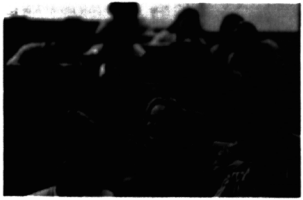
| avoir soif | to be thirsty | avoir froid | to be cold |
| avoir tort | to be wrong | avoir besoin de | to need |
| avoir chaud | to be hot | avoir raison | to be right |
| avoir sommeil | to be sleepy |
Grammar Notes: You have now used a number of idiomatic expressions with the verb avoir. These expressions mainly refer to conditions; therefore, whenever the speaker is referring to the past, you'll most often find the imparfait rather than the passé composé. Except for reviewing the forms of avoir, and recalling the normal use of the imparfait for ongoing past conditions, there is little grammar to consider.
Exercice III
The pronoun on has a number of equivalents in English: "one" (rather formal), "people" (generic), and "you" and "they" (when they refer to some indefinite general group, not to a particular "you" or "them"). Complete the following statements about when people ("you," "they," "one") need something or are hot, cold, right, wrong, and so on.
Set a. Model: Quand on n'a pas bu, _________________________________
Quand on n'a pas bu, on a soif.
(Use an avoir construction in the blank.)
- Quand on n'a pas mangé, _________________________________
- Quand il neige, _________________________________
- Quand il y a du soleil, _________________________________
- Quand on est pauvre, _________________________________
- Quand on dit que deux plus deux font cinq, _________________________________
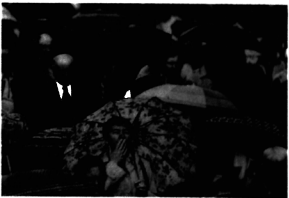
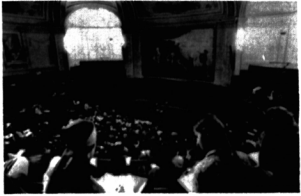
Set b. Model: On a besoin d'un parapluie quand _________________________________
On a besoin d'un parapluie quand il pleut.
(Use any appropriate construction in the blank, not necessarily with avoir.)
- On a soif quand _________________________________
- On a sommeil quand _________________________________
- On a besoin d'un pull quand _________________________________
- On a mal à la téte quand _________________________________
- On a faim quand _________________________________
DIRE, to say, tell.
| Je dis toujours la vérité. | I always tell the truth. |
| Tu dis qu'elle est malade? | You say that she's sick? |
| Elle dit "bonjour". | She says "hello." |
| Nous disons "au revoir". | We say "farewell." |
| Qu'est-ce que vous dites? | What are you saying? |
| Ils disent qu'ils ont froid. | They're saying that they're cold. |
| Passé composé: j'ai dit, ... | |
| Imparfait: je disais, ... | |
| Futur: je dirai, ... | Futur proche: je vais dire, ... |

Questions et Réponses
B. What are you going to do tomorrow? When are you going to leave?
- —Qu'est-ce que vous allez faire demain?
- —Je vais aller aux cours, comme toujours.
- —Je vais travailler.
- —Quand allez-vous partir?
- —Nous allons partir demain. (Le train part à six heures du matin. Tu peux aller à la gare avec nous?)
- —Nous partons2 tout de suite. (Pourquoi?)
2 This is the use of the present tense (nous partons) for the future, just as it is used colloquially in English ("We're leaving").
Exercice IV
Prepare at least five answers to questions like No. 1. and be ready to ask those questions, changing the time period mentioned (instead of demain, you could say ce soir, for example). Then create at least five additional questions following the pattern in No. 3. (You can ask "when" or "where." plus inquire about some specific activity. ) Remember, you are not restricted to asking directly or exclusively about the person to whom you are talking. Make it more meaningful by referring to things of interest to your fellow students now.
Grammar Notes: The verb tables provide the first-person form of the future tense for your information. In French, as in English, bv far the most common way of expressing the future in a verb construction is with aller ("to go") plus an infinitive, as illustrated above. Use it as much as possible: it's very easy and very useful. For comments on the construction, see the Reference Grammar, 6.3.3.
Questions et Réponses
C. Is John bigger than Paul?
- —Jean est plus grand que Paul?
- —Oui, il est plus grand que Paul.
- —Non, mais il est aussi grand que Paul.
- —Non, il est moins grand que Paul.
- —Marie est moins sportive que Louise, n'est-ce pas?
- —Oui, elle est moins sportive que Louise.
- —Non, elle, est plus sportive que Louise.
Exercice V
Using the adjectives below and others you recall or look up, make up questions that fit your class, your friends, their friends, and current political or sports figures.
Chances are, for example, you could easily compose a question about some political figures: "Est-ce que P*** est plus honnête que N***?" We've provided the three possible comparatives (plus, "more"; moins, "less"; and aussi, "as"), but you should feel free to respond to questions simply with a contrasting adjective. You don't have to limit yourself to people: you can ask about objects, plants, groups, animals, and so forth.
Some adjectives to use
| amusant | bon, bonne | célèbre |
| chaud | fort | fou, folle |
| grand | heureux, -euse | joli |
| lourd (heavy) | mauvais | moderne |
| mouillé (wet) | pauvre | propre (clean) |
| sec, sèche (dry) | tranquille (peaceful) | utile (useful) |
Lecture
Avons-Nous un Sixième Sens?
La vue0, l'ouïe1, l'odorat, le goût et le toucher sont les cinq sens grâce auxquels nous entrons en contact avec le monde qui nous entoure. C'est par leur intermédiaire que notre cerveau2 sait exactement où nous nous trouvons, ce que nous faisons, comment nous nous sentons, et ce qui se passe3 autour de nous. Sans eux—essayez un instant de penser à ce que nous serions sans eux—notre vie serait à peine celle d'un végétal.
En dehors des cinq sens, les savants4 font des recherches sur un sixième sens, appelé perception extra-sensorielie. C'est un phénomène assez répandu5, mais encore mal connu. Par exemple lorsque deux amis, parfois séparés par des kilomètres, pensent à la même chose au même instant: il semble que des messages s'échangent de l'un à l'autre par la pensée. Certaines personnes se disent capables de lire dans la pensée d'autrui6. Mais cela n'a jamais été vérifié.
0 sight
1 hearing
2 brain
3 is going on
4 scientists
5 widespread
6 of others
Common and Uncommon Knowledge
The following are simple facts to check, in Le Petit Larousse or elsewhere. These questions are unrelated; they might serve as different points of departure for short class comments or discussion. The questions are in French now; your instructor will decide whether you answer in French or English.
- Qu'est-ce que le mercredi des Cendres?
- Quelle est la plus ancienne université d'Europe?
- Quels sont les principaux océans?
- Qui a découvert le radium?
- Qui était Ésope?
Vocabulaire
NOMS
| un besoin* | need |
| une boutique | shop (small, expensive, chic) |
| le chaud* | heat |
| un étage | floor, story |
| la faim* | hunger |
| le froid* | cold |
| une gare | station |
| un genre | kind, type, genre |
| une impression | impression |
| un journal | newspaper, diary |
| un magasin | store |
| le mal* | evil |
| un musée | museum |
| un parapluie | umbrella |
| un pull | pullover, sweater |
| la raison* | right, reason |
| la soif* | thirst |
| le sommeil* | sleepiness |
| une tête | head |
| le tort* | wrong |
| la vérité | truth |
* Ail these words are nouns, but they occur most frequently in idiomatic constructions with avoir, as given in Questions et réponses, A.
VERBES
| dire | to say, tell |
| préférer | to prefer |
| revenir | to come back |
| travailler | to work |
| visiter | to visit (a museum, a city) |
| rendre visite à quelqu'un | to visit someone |
ADJECTIFS
| assis | seated |
| cher, -ère | expensive, dear |
| excellent | excellent |
| fantastique | fantastic |
| fabuleux, - euse | fabulous |
| gros, grosse | big, fat |
| incroyable | unbelievable, incredible |
| intime | intimate, personal, private |
| pauvre | poor |
See also the list with Exercice V.
ADVERBES
| alors | then, next |
| à midi | at noon |
| aussi | as |
| mieux | better |
| moins | less |
| plus | more |
| pourquoi | why |
PREPOSITIONS
| près de | near |
MISCELLANEA
| au revoir | good-bye, farewell |
| n'importe | no matter |

